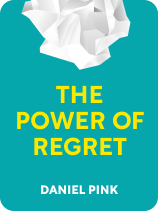

This article is an excerpt from the Shortform book guide to "The Power of Regret" by Daniel Pink. Shortform has the world's best summaries and analyses of books you should be reading.
Like this article? Sign up for a free trial here.
What are the things you regret most in life? Does everyone have the same regrets?
While everyone has regrets unique to their life, they tend fall into the same categories. According to Daniel Pink, the author of The Power of Regret, people tend to regret things done and things not done.
Here’s a look at the most common regrets people have in life.
Regrets of Things Done vs. Regrets of Things Not Done
Pink first divides the things you regret most in life into two categories: regrets of things done and regrets of things not done. A regret of things done occurs when people do something and then wish that they hadn’t, such as stealing from a grocery store or cheating on their spouse. A regret of things not done occurs when someone doesn’t do something they wish they had. This could be an opportunity they let pass by, such as starting their own business or asking someone out on a date.
Most people tend to have more regrets of things not done than regrets of things done. Pink also notes that the ratio between the two types also grows more lopsided with age: Young people tend to have an equal number of regrets of things done and regrets of things not done, but as they age, they gain more regrets of things not done. This is because, as time goes by, they have fewer opportunities to finally do the things they wish they had done earlier in life.
(Shortform note: Psychologists have also found that the passage of time changes your relationship to both types of regrets, but in opposite directions. You are more likely to regret a thing done if you did it recently. However, the more time passes, the less you will tend to regret it. Regrets of things not done work in the opposite direction. You are less likely to regret not doing something if you failed to do it recently, but as time goes by, you’ll come to regret it more and more.)
The 4 Categories of Regret
Pink clarifies that most of the regrets people have in life fit into one of four categories. Each of these categories includes either regrets of things done or not done, but they refer to the areas of people’s lives where they wish they’d acted differently. Pink derives these categories from a broad national survey asking people to share their regrets. In this section, we’ll explore his four main categories of regret: stability, ethics, personal risk-taking, and relationships.
Regret Category #1: Stability
Stability regrets occur when people wish they’d done more to invest in creating a stable life for themselves. People experience stability regrets when they realize the destabilizing consequences of their lifestyle late in life and wish they could go back and adopt different habits or attitudes in the past. Common stability regrets include wishing that they had taken better care of their physical health, invested more in their education and skill development, or handled money more responsibly.
Regret Category #2: Ethics
People experience ethical regrets when they feel they’ve acted against their personal code of ethics. These are regrets of things done more often than regrets of things not done, as people reflect on their moral transgressions. However, some people have ethical regrets of things not done as they look back on missed opportunities to serve their communities or stand up for their values.
The most common ethical regrets voiced by participants in Pink’s survey were bullying and infidelity. Many participants also regretted having abortions or missing out on the opportunity to serve their countries through the military or other branches of national service.
Regret Category #3: Bravery
People experience bravery regrets when they fail to take a risk that is important and meaningful to them. These are almost always regrets of things not done, as people look back on their lives and wish they’d taken a risk to do something they really wanted instead of playing it safe. They imagine how their lives would be different if they had followed their dream and see a loss of growth and potential.
People with bravery regrets may wish they had started a business, invested themselves more fully in passions like music or art, chosen a more ambitious career path, or made a big life decision like moving to a new country.
Regret Category #4: Relationships
People experience relationship regrets when they feel they’ve missed an opportunity for a meaningful connection with someone. They compare the life they have without an important person—a friend, family member, or romantic partner—and imagine the life they could have had with this relationship.
Relationship regrets can be either regrets of things done or regrets of things not done. Some people lose relationships because of an action they took, such as starting a fight or pushing someone away out of anger. Others may lose relationships simply because they failed to invest as much as they wanted to and drifted apart over the years.
Relationship regrets are the most common type of regret reported on Pink’s survey. Psychologists have identified quality relationships as the most important predictor of someone’s mental and emotional well-being. Therefore, people feel a great sense of loss at missing out on important relationships, leading them to experience regret.

———End of Preview———
Like what you just read? Read the rest of the world's best book summary and analysis of Daniel Pink's "The Power of Regret" at Shortform.
Here's what you'll find in our full The Power of Regret summary:
- A look at why most people feel regret, and what causes it
- The three worst ways to deal with regrets
- The five-step process for turning regrets into advantages






